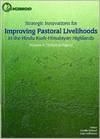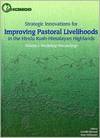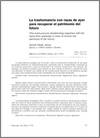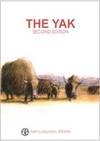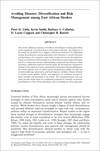In May 2002, ICIMOD and the Tibetan Academy of Agriculture and Animal Sciences organised an international workshop on 'The Changing Face of Pastoralism in the Hindu Kush-Himalayan - Tibetan plateau Highlands', to build a mutual understanding of the realities of highland pastoralism in the HKH-Tibetan plateau: the factors that have contributed to marginalisation, the response, the challenges faced by development workers and policy makers, existing programmes and policies, and future policy strategies. This publication provides summaries of 12 papers on aspects ranging from integrated pastoral production research, through various aspects of integrated development approaches, to participation as a driving force in the process of development and conservation initiatives. This will be of interest to all those concerned with helping the people of the rangelands to improve their livelihoods, and interested in the constraints and possibilities.
Year of publication: 2004Organization: International Centre for Integrated Mountain Development (ICIMOD)
Topic: Economy, Environmental services, Indigenous peoples, Land, Resilience, Value addition
Language: English
Type of document: Technical
Geographical coverage: South Asia
In May 2002, ICIMOD and the Tibetan Academy of Agriculture and Animal Sciences organised an international workshop on 'The Changing Face of Pastoralism in the Hindu Kush-Himalayan - Tibetan plateau Highlands', to build a mutual understanding of the realities of highland pastoralism in the HKH-Tibetan plateau: the factors that have contributed to marginalisation, the response, the challenges faced by development workers and policy makers, existing programmes and policies, and future policy strategies. This publication provides summaries of 28 oral presentations on topics ranging from integrated pastoral production research, through various aspects of integrated development approaches, to participation as a driving force in the process of development and conservation initiatives. This will be of interest to all those concerned with helping the people of the rangelands to improve their livelihoods, and interested in the constraints and possibilities.
Year of publication: 2004Organization: International Centre for Integrated Mountain Development (ICIMOD)
Topic: Economy, Environmental services, Indigenous peoples, Land, Participation, Resilience, Value addition
Language: English
Type of document: Technical
Geographical coverage: South Asia
The present volume brings together the main outcomes of the project TRANSHUMOUNT – A review of the role of transhumance in mountain ecosystem process and dynamic. TRANSHUMOUNT was an Accompanying Measure from the EU Research 5th Framework Programme.
Year of publication: 2004Organization: Individual authors
Topic: Environmental services, Land
Language: English
Type of document: Scientific
Geographical coverage: Europe
La trascendencia ecológica que ha tenido y tiene la trashumancia tradicional de las razas de ganado autóctono es extraordinariamente importante para el mantenimiento sostenible de los procesos productivos y para la conservación de nuestros ecosistemas más valiosos. Sin embargo, las políticas actuales están llevando en gran medida al deterioro y pérdida de estas vías pecuarias. El posible uso múltiple de las mismas puede favorecer su permanencia siempre que estos usos complementarios sean compatibles con la actividad del ganado.
Year of publication: 2004Organization: Individual authors
Topic: Climate change, Environmental services, Indigenous knowledge, Resilience
Language: Español
Type of document: Technical, Policies and legislation
Geographical coverage: Europe
This book traces briefly the development of the yak, and then describes in some detail its characteristics, productivity, and husbandry. It gives examples of yak production systems from the highlands of Asia, commenting on the rangeland ecosystem, the yak breed, its nutrition and management. There is also a discussion of the more recent research and development projects that may provide a basis for improvements in yak performance and in the utilization of the rangelands. The research and development may also lead to a wider distribution for the yak and to a better utilization of yak products. Any marked changes in yak husbandry are also likely to have far-reaching consequences for the social fabric of yak herding pastoralists.
Year of publication: 2003Organization: Food and Agriculture Organization of the United Nations (FAO)
Topic: Economy, Food security, Indigenous knowledge, Indigenous peoples, Organization, Value addition
Language: English
Type of document: Technical
Geographical coverage: Global
This study looks into the traditional roles of pastoral women in peace and conflict and confirms that women play important roles, both positive and negative, with regard to raiding and other forms of conflict. Women can greatly influence the behaviour of husbands and sons. This informal power held by women in pastoral households is crucial for peacebuilding interventions to build on.
Year of publication: 2003Organization: The African Union – Interafrican Bureau for Animal Resources (AU-IBAR)
Topic: Conflict, Gender and youth
Language: English
Type of document: Scientific
Geographical coverage: Eastern Africa
This study defines pastoralism in the Indian context whilst looking at the size, location, ethnic identities and migration pattern of major pastoralist groups in the Himalayan and arid and semi-arid regions. In addition, it highlights the major problems experienced by different types of pastoralists, as well as past and likely trends of pastoral development.
Year of publication: 2003Organization: Individual authors
Topic: Climate change, Economy, Environmental services, Food security, Indigenous peoples, Organization, Resilience, Social services
Language: English
Type of document: Technical
Geographical coverage: South Asia
This article addresses processes of livelihood diversification among pastoralists in the rangelands of northern Kenya and southern Ethiopia. It suggests a theoretical framework for addressing income diversification among pastoralists with reference to current literature and databases; presents a case study on pastoral income diversification based on preliminary field research in northern Kenya and southern Ethiopia, and summarizes current understandings of pastoral diversification while pointing to additional empirical research needs.
Year of publication: 2002Organization: Individual authors
Topic: Resilience
Language: English
Type of document: Technical
Geographical coverage: Eastern Africa


